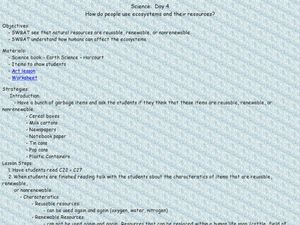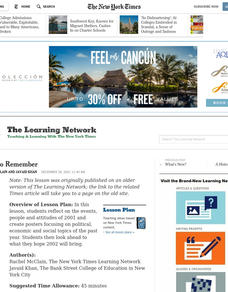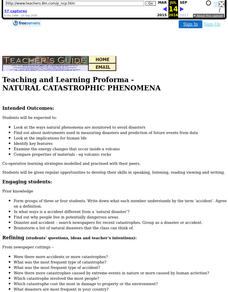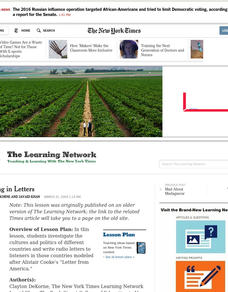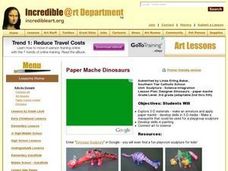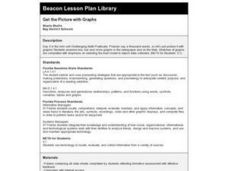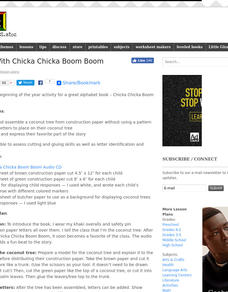Curated OER
I Watch Babies Grow
Students examine the potential of human beings. For this philanthropy lesson, students research the life of peer as they interview them and create a timeline that features important moments in their lives.
Curated OER
Now We Teach Six Rs
Students explore recycling. In this ecology lesson, students sort classroom garbage into items that can be reused, reduced, or recycled. Students brainstorm ideas for reusing items and discuss ways to celebrate Earth Day at...
Curated OER
Thanksgiving Dinner
Students plan a traditional Thanksgiving dinner. In this Thanksgiving lesson, students compare and contrast the first Thanksgiving to Thanksgiving celebrations today. Students plan a traditional Thanksgiving dinner and research the costs...
Curated OER
Does Climate Change Exist? Healthy Skepticism? Debating the Truth, Evidence, and Certainty of Climate Change
Pupils study climate change and the arguments of scientists that it exists. In this climate change lesson students complete a class activity and answer questions.
Curated OER
How do people use ecosystems and their resources?
Learners examine how natural resources are reusable, renewable or nonrenewable. In this ecosystems lesson plan students see the effects humans have on ecosystems and complete an art lesson plan activity.
Curated OER
Re-Viewpoints From 2002
Students explore how editorials use various devices to convey a message to a reader. They select key news topics from 2002 and write their own editorials.
Curated OER
Critical Path
Young scholars widen their understanding of the different points of view surrounding current news topics. They research a current controversy on which public opinion is divided and write a concise commentary on the topic expressing a...
Utah LessonPlans
Water, Water Everywhere
Murals are used to represent the various ways we rely on water.
Curated OER
Tempest-Tossed
Students examine aid to India in the wake of the October 29, 1999 cyclone.
Curated OER
Every Picture Tells a Story
Students consider controversial photos of Elian Gonzalez and decide how they, as editors of the Times, might have displayed them. They choose, discuss, and write about other famous images from photojournalism to decide what makes the
Curated OER
A Year to Remember
Learners reflect on the events, people and attitudes of 2001 and create posters focusing on political, economic and social topics of the past year. They look ahead to what they hope the next year bring.
Curated OER
Natural Catastrophic Phenomena
Sixth graders examine the ways natural phenomena are monitored to avoid disasters. They find out about instruments used in measuring disasters and prediction of future events from data.
Curated OER
Want Ad: Healthy Eater
Learners to explain the differences between healthy and unhealthy eating habits and what steps they need to take in order to make healthy eating choices.
Curated OER
Putting It All Together: Creating an artifact
Eleventh graders analyze a variety of images and documents, then create artifacts to archive, such as a newspaper, an album, or scrapbook from their writings, drawings, and projects. They present learned information to their peers
Curated OER
Reporting in Letters
Students investigate the cultures and politics of different countries and write radio letters to listeners in those countries modeled after Alistair Cooke's "Letter from America."
Curated OER
Musical Makeover
Students explore the importance of folk music is various ethnic cultures.
Curated OER
Seeing Stars
Students explore the history of planetariums and the features of the Hayden Planetarium as a springboard to planning, developing and displaying their own planetarium exhibits.
Curated OER
Ancient History Cyber-Journalists
Students describe and assess circumstances surrounding a major historical event from the ancient world by using Internet (and other) resources to research its location, people, and repercussions, & write a newsletter that summarizes...
Curated OER
Designer Dinosaurs - Paper Maché
Third graders explore 3-D materials by making a macquette that could be used for a playgroup sculpture. The students design and execute papier-mâché dinosaurs. They develop painting skills and connect art to science.
Curated OER
Get the Picture with Graphs
Fifth graders examine line, bar and circle graphs in the newspaper and on the Internet. They complete sketches of graphs with an emphasis on selecting the best model to depict the data collected.
Curated OER
Fun With Chicka Chicka Boom Boom
Students complete various activities for the book, "Chicka Chicka Boom Boom." They listen to the story, construct a coconut tree, create paper letters for the coconut tree, and write about their favorite part of the story.
Curated OER
Everyone Knows It's Windy
Learners create an anemometer, an instrument that measures wind speed.
Curated OER
Bench-Pressing Issues
Students examine some of the issues that may be facing the changing United States Supreme Court. With further exploration, they formulate their own opinions and deepen their awareness of these critical topics.
Curated OER
Recognizing Types of Propaganda in Advertising
Students recognize the various types of propaganda so that they be better able to recognize propaganda in its various forms.






